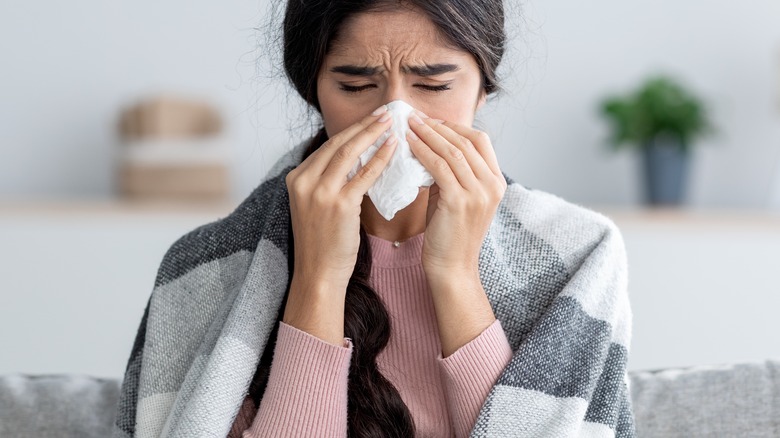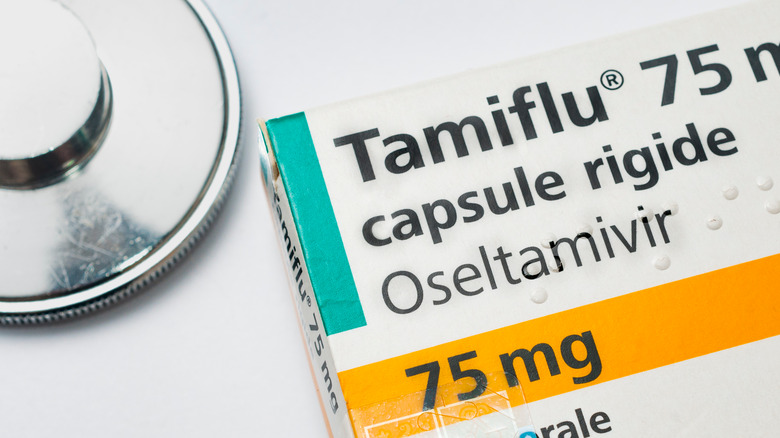Tips For Recovering From The Flu
If there's one thing we can't stop in this world, it's the seasons rolling around once again. And in addition to spring, summer, fall, and winter, there's one more season lurking in there that it's easy to forget about until it knocks at your door: flu season.
We all know that the flu is common, but it's pretty wild how many people it actually affects each year. According to the CDC, up to 41 million individuals in the United States contract the illness annually. And while the vast majority of people recover from the flu without a hitch, it remains a serious condition, with tens of thousands of deaths occurring as a result of flu each year.
That's why it's important to treat your body right when you're recovering from the flu, not only to ease your way out of it, but also to avoid prolonging your illness and increasing the risk of complications. But between flu remedies passed down from generation to generation, actual health professionals' advice, and your intuition, there are a lot of opinions out there about how best to feel better. That's why we wanted to clear it up, once and for all, with our top tips about how to feel better when you have the flu.
Stay in bed and rest up
Anyone who's been struck with the flu will know how much it can knock you out. But once you start to feel slightly better, it's tempting to fight through your symptoms and push yourself back into action before you're fully ready. But this is one of the worst things you can do for your flu recovery, especially when you still have a fever. By resting, you're allowing your body to do the work it needs to do to fight the flu infection — and more importantly, not placing yourself in uncomfortable situations until you feel fully better (via Better Health).
You also need to consider the risk that you might infect others. According to the NHS, you're infectious with the flu for a short amount of time before you start exhibiting symptoms (around a day or so), but once they strike, it's possible to infect other people for up to a week. If you have a compromised immune system, this period may be even longer, and children remain infectious for an extended amount of time, too. This means that every time you leave the house when you're still symptomatic, you risk passing on your infection to other people. Instead, do the responsible thing, for yourself and others: Stay in bed, and let your body do the work.
Steer clear of certain foods
When you're recovering from the flu, what you eat is crucial, and the right foods can help you to feel better in no time. But there are also certain foods that may seriously hamper your recovery.
Eating lots of sweet foods could increase the time it takes for you to feel better, as "high sugar intake can suppress the immune system," compromising your white blood cells and causing your infection to remain strong, explains Baylor College of Medicine assistant professor of sports medicine Irvin Sulapas (via The Healthy). Refined carbohydrates like white bread or rice could have a similar effect, and may cause higher inflammation in the body.
And if you thought it was a good idea to reach for that whisky to pour into a hot toddy, think again. Alcohol not only has the same impact on your white blood cells as sugar and may also raise inflammation, but it also dehydrates you. "Hydration helps to decrease congestion by preventing your mucus from getting too dry so you are able to get it out of your body," says Sulapas. It also contributes to the removal of waste products. Without being properly hydrated, you could remain sick for longer.
Medicine can help with aches
Alongside the stuffy nose, sore throat, and fever that are in such ready supply when we have the flu, there's one other symptom that simply sucks: The aches.
When the flu virus works its way into our system, our army of white blood cells is released by our immune system to fight the subsequent illness this causes, and this creates inflammation through our bodies (via UCLA Health). The result of this is an aching sensation all over the body that can last for a few days or more. Not fun.
But when the aches knock at your door, taking a simple over-the-counter medication to relieve pain and bring down the inflammation could help you feel much better. Acetaminophen (commonly sold as Tylenol) is a pain management medication that can be effective for body aches, and may be included in medicines branded as being for a cold or the flu specifically (per the Mayo Clinic). Taking an NSAID like ibuprofen or aspirin could also be effective, thanks to their anti-inflammatory effect, reducing pain as well as fever. Whatever medication you opt for, it's vital that you follow the manufacturer's instructions for taking it, and not exceed the recommended dosage.
Keep yourself properly hydrated
If you're currently battling the flu, do you have a glass of water beside you? No? If not, we'd advise you to go and grab one right away. The importance of staying adequately hydrated when you're sick with the flu can't be overstated.
"Dehydration increases susceptibility of infection and complicates infection if you get it," says infectious diseases physician for Mercy Health Emily Simpson (via Mercy Health). The tricky thing is, when we're running a fever, we can become more dehydrated as our body tries to sweat it out — but then this leads to an even worse fever, as water and other fluids help us to control our body temperature (per Abbott).
The way to break this vicious cycle, though, is by stocking up on your liquids. Water is your best friend here, so be sure to drink it abundantly, and drinks that have electrolytes imbued into them can also be useful to replace lost salts. Herbal teas and other decaffeinated warm drinks could also provide a soothing effect. As much as you can, steer clear of caffeinated beverages like coffee or energy drinks, the latter of which can also contain high levels of sugar.
Try steam therapy to alleviate your symptoms
From sterilizing equipment to cleaning dirty sofas, there are quite a few things that steam can do. And when you have the flu, it could be just the thing you need to make your recovery a little easier.
Steam therapy is a simple at-home method of easing your flu, and can provide quick relief from some of your nastier symptoms, says Healthline. When you inhale steam, the mucus that sits in your airways (and prompts congestion when you're sick) is loosened up. This can reduce the irritation and stuffiness you feel, and make your breathing a little easier.
While steam therapy will make you feel better for a short time, it's important to remember that it won't make you get better any quicker, nor will it eliminate the virus from your system. But if you want to implement it for symptom relief, it's super easy to do. Grab yourself a bowl and fill it with boiling water. Then, place a towel or cloth around the back of your head, lean down over the bowl (being careful not to touch the hot water), and breathe the steam in gently for around 5 minutes.
Wear lighter, comfortable clothing
When you're trying to recover from the flu, being overly concerned about what you wear can go out of the window pretty quickly. But while we fully support this (and highly encourage you to dig out your most comfortable pair of sweats), make sure you're not wearing too much.
As your body tries to fight your infection, the fever that comes with a cold can stick around for days at a time, according to the CDC. And while your body temperature is sitting degrees higher than it normally is, it's important to take as many measures as possible to reduce it, like wearing lighter clothing so that you don't overheat (per Vicks).
Keeping the rooms that you're spending time in cool can also be a good way to slightly reduce your body temperature, which may ease your recovery. If you're especially hot, you may also want to apply a cool compress around your face and the back of your neck, as well as around other warm parts of the body. One of the best ways to try and keep your temperature down, though, is by resting up and not overexerting yourself.
Grab yourself an extra pillow
If you're anything like us, when you have the flu, you'll be spending a lot of time in bed. Hey, it comes with the territory, and we refuse to apologize for it. But while we give you full license to do a whole lot of nothing when you're recovering in bed, one thing we do recommend you do is to assess your pillow game.
When you're sick with the flu, your nasal passages become congested due to the inflammation the virus causes, exacerbated by the build-up of mucus in your airways (per Vicks). This can create not only a sense of discomfort but also trouble breathing — which can be a nightmare when you're trying to sleep, as lying down can make your congestion even worse (per MedlinePlus).
Using an extra pillow to elevate your head and nasal passages, however, can provide relief while you're in bed. It can also help keep your throat clear, so you won't be coughing so much (per Healthline). With that said, it's important not to overdo it on the pillow front, as this can just give you a neck ache and prevent you from getting any sleep. Usually, two pillows will do the trick, and you can just add another if needed.
Remember that recovery can take a while
We're not going to downplay it: Recovering from any illness can be really, really frustrating. You just want to be back to full health, free of all of these unpleasant symptoms and able to live your life to its fullest again. We get that. But patience is a true virtue when it comes to recovering from any illness, including the flu.
"Typically, an uncomplicated flu can last about a week," states Banner Health Center physician Russell Horton (per Banner Health). And during that time, you should try to resist the temptation to try and rush back into activities, as you could end up just making yourself even sicker.
For other folks, the flu may last even longer than that. "Having other chronic conditions or chronic respiratory diseases like asthma could extend symptoms," says Horton, and can also lead to an increased risk of further illness. That's why you should take it super slow, and only return to your daily activities once you're feeling fully better, with your temperature being normal for at least a day before going back to work. Until then, you'd better get started on that Netflix watch list.
Go easy on the exercise
If you're a fitness fanatic, having to take extended days off your workout regime while your body recovers can be pretty frustrating. Whatever you do, though, don't rush back into exercise once you're feeling a little brighter, and definitely don't try to exercise through your illness.
When you're riddled with the flu, your temperature is likely to be up, and any exercise you do will only make this higher, as WebMD states. This will just lead to a higher risk of dehydration, which can then make the time it takes for you to recover even longer. If you normally work out in a gym, heading there to exercise when still sick could also result in you infecting other people.
And once you've recovered from the flu, you must take things slow when coming back to your workout routine. Try to wait at least a week after recovery before you hit the exercise hard, advises Banner Health. Light exercise shouldn't pose too many problems, but just make sure you're listening to your body and resting when it tells you to.
Soups and broths are your friends
Flu season often coincides with soup season, so chances are if you're struck by the influenza virus, you already have a couple of cartons ready to go in your fridge. And if you do, this is going to be pretty beneficial to your recovery.
Soups and broths are excellent choices while you get better, according to the Cleveland Clinic. The warming liquids in both will provide relief to your sinuses and sore throat. Plus, soups and broths are both usually vitamin and antioxidant-rich — even more so if your soup is packed with vegetables.
And there's another reason why chicken soup is so prized by moms with sick kids everywhere: According to a study published in Chest, it could even provide an anti-inflammatory effect, which may make you feel better. As you continue to recover, try and keep your diet as nutritious as possible, emphasizing fruit and vegetable intake and trying to get a good amount of vitamin C. Other food additions, like spices and garlic, could give your immune system a boost, and may hasten recovery. Above all, though, make sure what you're eating makes you feel good while remaining nutritious and tasty. Now is not the time to punish yourself.
A humidifier can help
When it's cold outside, the air can get seriously dry. And in addition to being a nightmare for your skin, this can also contribute to the flu spreading more easily, says Medical News Today.
By making the air around you moist, however, not only can you make the flu less likely to spread, but you can also speed up your own recovery by a bit. Dry air can make your sore throat and stuffy nose even worse by irritating your airways, but by using a humidifier in the room you're in, you can reduce this effect, providing relief to your nasal passages. This moisture could also have a positive effect on your lungs if they've been affected by the flu or bronchitis.
A vaporizer may also have the same effect, and as a bonus, you may be able to add flu medicine into one to disseminate it through the air, further easing symptoms. Just bear in mind, though, that humidifiers can quickly become unsanitary, thanks to bacteria multiplying in them. When this happens, they may produce some negative symptoms upon use, including flu-like symptoms (per the Mayo Clinic).
Foods containing elderberry may help with recovery
There are all sorts of foods out there that have been claimed to have therapeutic benefits for the flu. But of all of the dietary choices you could put in your basket, one small berry could be the most beneficial of all.
Elderberry, long used as a flu remedy, has been found in some scientific studies to have a positive effect on flu symptoms, as Healthline discusses. A study published in the Journal of International Medical Research found that elderberry extract, given to study participants who had the flu over five days, seemed to increase the speed of recovery considerably, compared to participants who were given a placebo syrup. Another study, published in Nutrients, found that elderberry supplements provided symptom relief from seasonal respiratory illnesses.
It should be pointed out, though, that both of these studies were looking at a relatively small number of people. Thus, further research is likely needed. It should also be pointed out that elderberries aren't a cure for the flu, and should only be used alongside other treatment methods. Remember, too, that we don't advise snacking on elderberries, as that may result in you feeling pretty ill. Instead, consume them through extracts or lozenges.
For certain people, antivirals could be recommended
For the majority of people, the flu will clear up with a lot of bed rest, a lot of fluids, and if you're like us, a lot of complaining. But there can be situations where a little more assistance in fighting the flu can be necessary.
Antiviral drugs designed to fight the flu virus, like Tamiflu, Relenza, and Xofluza, can be prescribed to individuals who are more at risk from the flu, and work by stopping the flu virus from multiplying as quickly as it normally may (via WebMD). Although they're generally used early on an infection, they can be taken later on in the flu's duration, and may serve to make your symptoms shorter and less impactful.
Generally, though, most people shouldn't be taking antivirals whenever they're at risk of flu infection. If you're in a higher-risk category, however (e.g., you have asthma or heart disease, or you're pregnant), it could be wise to take antivirals once you become symptomatic, if your doctor recommends it. There's a very good reason why flu vaccines are so easily available when the season rolls around, though: They remain the best way to keep flu at bay.
If things get worse, see a doctor
With any luck, your flu infection will pass without consequence. A few days of feeling pretty nasty, and then you'll be back in full form. But there can be situations where people who have the flu may find it necessary to contact their doctor and seek medical assistance. The presence of emergency symptoms can be cause for concern (and should be promptly responded to with a visit to a healthcare unit), per Healthline. If you experience dizziness or a loss of consciousness, trouble breathing, chest pains, extreme vomiting, or a notable stiffness in your neck, head to an emergency room immediately.
It's also important to see your doctor if you're in a high-risk category for flu infection. People with medical conditions like heart disease, diabetes, or asthma, immunocompromised individuals, older people, and pregnant people (or people who have just given birth) should consult with a healthcare professional if they develop the flu, as they could be more at risk of complications.
Finally, if your symptoms don't clear up within a fortnight, your fever returns worse than before, or you have localized pain or a persistent cough, this may indicate further issues from your flu infection, necessitating a visit to your doctor.















